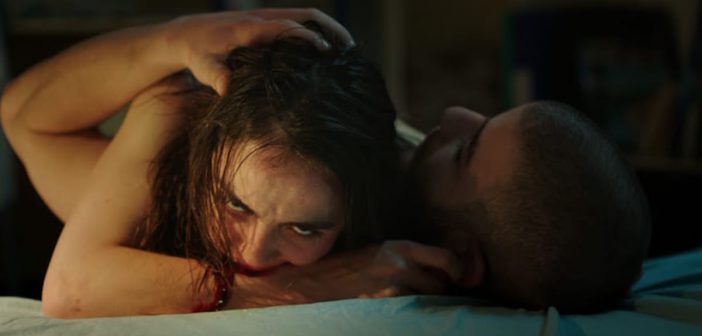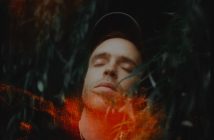Raw is Julia Ducournau’s debut feature-length directoral effort and having first been screened at various festivals, gained quite a reputation following reports of people vomiting and walking out of screenings. However, following the screening at the BFI, Ducournau stressed that she never intended to ‘revolt’ her audience.
When asked why Ducournau used the prism of cannibalism and horror to approach female sexuality, she replied ‘For me cannibalism in my movie isn’t just about sexuality…it would be a bit reductive to say that. Cannibalism stands for a lot of things, including love but too much of it. The reason, really, why I tackle sexuality is because it’s a sort of coming-of-age. So for me it’s more about coming-of-age, rather than the cannibalism itself.’ One of the key aspects that the film strives to show is that this is far from being just a horror, at the heart of the film is this dynamic between two sisters, and this family drama that really permeates throughout the narrative. The first instance of cannibalism is in the presence of her sister and is not at all entwined with sexuality, this drives home this idea of love and coming-of-age.
Having previously stated the likes of Cronenberg and Argento as having influences over her career as a whole, Ducournau was asked how much they have had an influence over this feature in particular. ‘Cronenberg has had an influence over my whole body of work, even from when I was first writing scripts but there are no direct references in this particular film. He was one of the first directors that I discovered by myself without anybody’s direction.[When watching Crash] My first reaction was repulsion, I was taken aback. I went back because it shook me to the core and I wanted to understand why and the reason, I feel, that it had such an affect on me is that the way he films bodies is completely unyielding.’ Raw‘s horror comes more from Ducournau’s fascination with the body and it’s transformation rather than cheap jumpscares or lashings of gore. Films like The Fly have a clear mirror to this aspect of the film and makes sense considering her love for Cronenberg. She went on to say that Cronenberg understands death and the universality of it and that it’s something that, ultimately, everyone can relate to.
Expanding on the idea of bodies and the female representation, she talked about how she approached certain scenes which do explore the female body and how female bodies are represented in today’s world. “There’s a universality in bodies that transcend race, class, gender, sexuality and all of that. In the representation of male bodies it’s often taken for granted, with women unfortunately it’s different. In daily life, the way women’s bodies are represented is through filters, such as sexualisation and glamorisation. (In Raw) I really wanted to take the female body out of that niche and make it universal and to talk about that intimacy that we all have and that’s why it was so important that my character was a female”. The film itself, does explore the introduction (of it’s main character) to sexuality and as such, Ducournau’s handle on the subject had to be delicate but relatable and unlike usual horror cliches/tropes, it’s handled with real care. “I’ve found that the birth of sexuality in young women is oft described in a fashion that makes them a victim…what the fuck is that about?! This is ridiculous and I really wanted to show that you can discover sexuality in a way that’s totally normal and to feel like a desirable body. Again, for me, it’s a door to universality. In sexuality, we all want the same thing and I would’ve done the same thing for a male but it’s more important to show it from a female point of view because this is not often what we get’.
Taking a shift from that line of conversation, Ducournau was asked how this differed from her previous work as a director and whether not she enjoyed it more and whether it was more work to which she burst out laughing and replied “Ha, fuck yeah! I mean, I spent five years doing this movie. It’s like, 1/6th of my life! I mean even when I did my short, which took 6 months, it’s still a process. People wanna become directors just because they want to and they don’t understand that it’s a craft and it’s something that you don’t manage the first time and it’s something that’ll probably take a lifetime to master. But I love it, and I love that it’s painstaking because if you could make it for free without any work, I wouldn’t do it.”
When discussing her characters and how she was able to humanise her lead, she described the difficulty of nailing the tone. “It’s hard to balance and to mix genres and it took three long years of writing the script for me to get it right. When your main character is going to become a cannibal during the course of the movie you have to find a way of building up the empathy around her otherwise you’re fucked.” She went on to describe how she used many different techniques to humanise her, including introducing us through the eyes of her gay roommate Adrien and subjecting her to hazing, something that Ducournau understood the audience would immediately take her side on.
Discussing Raw with her, you begin to understand the thought and care that went behind it’s creation and the many layers that the film has beyond it’s exterior. There’s no irony in her describing it as her baby and how protective she is over the final product. In the end, it’s a fantastic and interesting debut and cements her as one of the most promising new voices in horror cinema.
Raw is in limited cinemas now.



